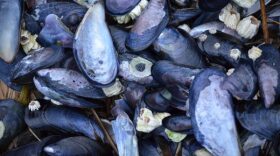The new strain of bird flu that arrived in Alaska with the spring migration has now been detected in a fox that died in the Aleutian Islands.
Wildlife officials say the red fox, as well as eagles, found dead in the Unalaska area, were most likely feeding on birds that had died from the H5N1 avian influenza.
State veterinarian Dr. Bob Gerlach says that’s different from previous strains of bird flu.
“We generally don’t see avian influenza causing problems in these species, but this is an unusual case,” Gerlach said. “So between that and the significant number of mortalities among waterfowl, it’s a concern and significant.”
The H5N1 bird flu has caused the deaths of millions of poultry in the Lower 48, as well as wild birds and some foxes there.
In early May, Alaska confirmed its first case of the virus. It was found in a non-commercial flock of chickens and ducks in the Matanuska-Susitna Borough. But so far, wildlife officials say, it has not impacted domestic mammals in Alaska, and this strain and previous strains have not proven to be a significant health concern for humans or domesticated dogs and cats.
Those pets could still be susceptible, and Gerlach says there are plenty of other reasons to keep pets away from wildlife, especially dead birds.
“If there is a dead bird or dead animal there, we don’t know what they died from,” Gerlach said. “If it’s not influenza that’s transferred, it could be either bacteria or maybe another virus that is transferable, and the most common ones we see are salmonella and E. coli. And then obviously those can be transferred to people, too.”
Alaskans harvesting birds or other wildlife for food are urged to use the usual safety precautions, like wearing gloves, thoroughly cooking meat and not eating animals that appear to have been sick.
Anyone who sees a sick bird or one acting strangely, or the carcass of a bird, if the cause of its death is not readily apparent, can call the U.S. Fish and Wildlife Service’s Alaska Sick or Dead Bird Hotline. That number is 1-866-527-3358.





